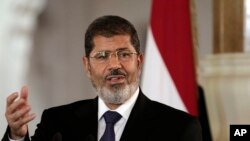CAIRO —
Egyptian President Mohamed Morsi said on Saturday he planned to reshuffle his Cabinet in a move that could help build political consensus around a $4.8 billion loan Cairo is seeking from the International Monetary Fund.
Morsi's opponents have been demanding the formation of a new government to oversee parliamentary elections expected to begin later this year. The United States, a major donor to Cairo, has grown more critical of Morsi of late, listing a lack of political inclusivity as one of its concerns.
The IMF has stressed the need for broad support for a loan agreement seen as vital to easing Egypt's economic crisis but which is also likely to bring with it politically-sensitive austerity measures such as tax increases and subsidy cuts.
An IMF technical mission held 12 days of talks on the loan agreement but left earlier this week without an agreement. While in Cairo, the mission met with an array of Egyptian opposition parties in an effort to broaden support for any deal.
Tension between Morsi and his more secular-minded opponents has fueled spasms of unrest since late last year, undermining hopes for economic recovery.
In pre-recorded comments to al-Jazeera of which the channel aired segments ahead of the expected airing of a full interview later on Saturday, Morsi said the reshuffle would include multiple ministries and would happen soon.
On Twitter, he said he would also change some of his provincial governors.
"Cabinet reshuffle and governors' appointments, the most efficient will take up responsibility in order to achieve the demands of the revolution," Morsi tweeted, referring to the 2011 uprising that ousted then President Hosni Mubarak.
Morsi did not say whether the reshuffle would include Prime Minister Hisham Kandil, whose performance has drawn increasingly fierce criticism, including from the Muslim Brotherhood movement that propelled the president to power in an election last June.
Kandil was a little-known technocrat at the time of his appointment last July. Economists have faulted his government, which includes Brotherhood members in some ministries, for failing to get the economy moving.
It seems unlikely that Morsi will be able to draw his most critical opponents into government for now: the political division runs too deep. But he may be able to bring some liberals and moderated Islamists into cabinet, said Yasser el-Shimy, Egypt analyst with the International Crisis Group.
"Some of the ministers involved in the IMF negotiations will keep their jobs, such as [Planning Minister] Ashraf al-Araby, but I think the IMF would be happy to see a coalition government," el-Shimy said. "They would like to see a more consensual approach to politics."
"With the parliamentary elections potentially not happening for six months, there might be hope that they can defuse the political standoff," he added.
Morsi's opponents are also demanding the removal of the prosecutor general, who was appointed by the president in November in controversial circumstances.
Morsi's opponents have been demanding the formation of a new government to oversee parliamentary elections expected to begin later this year. The United States, a major donor to Cairo, has grown more critical of Morsi of late, listing a lack of political inclusivity as one of its concerns.
The IMF has stressed the need for broad support for a loan agreement seen as vital to easing Egypt's economic crisis but which is also likely to bring with it politically-sensitive austerity measures such as tax increases and subsidy cuts.
An IMF technical mission held 12 days of talks on the loan agreement but left earlier this week without an agreement. While in Cairo, the mission met with an array of Egyptian opposition parties in an effort to broaden support for any deal.
Tension between Morsi and his more secular-minded opponents has fueled spasms of unrest since late last year, undermining hopes for economic recovery.
In pre-recorded comments to al-Jazeera of which the channel aired segments ahead of the expected airing of a full interview later on Saturday, Morsi said the reshuffle would include multiple ministries and would happen soon.
On Twitter, he said he would also change some of his provincial governors.
"Cabinet reshuffle and governors' appointments, the most efficient will take up responsibility in order to achieve the demands of the revolution," Morsi tweeted, referring to the 2011 uprising that ousted then President Hosni Mubarak.
Morsi did not say whether the reshuffle would include Prime Minister Hisham Kandil, whose performance has drawn increasingly fierce criticism, including from the Muslim Brotherhood movement that propelled the president to power in an election last June.
Kandil was a little-known technocrat at the time of his appointment last July. Economists have faulted his government, which includes Brotherhood members in some ministries, for failing to get the economy moving.
It seems unlikely that Morsi will be able to draw his most critical opponents into government for now: the political division runs too deep. But he may be able to bring some liberals and moderated Islamists into cabinet, said Yasser el-Shimy, Egypt analyst with the International Crisis Group.
"Some of the ministers involved in the IMF negotiations will keep their jobs, such as [Planning Minister] Ashraf al-Araby, but I think the IMF would be happy to see a coalition government," el-Shimy said. "They would like to see a more consensual approach to politics."
"With the parliamentary elections potentially not happening for six months, there might be hope that they can defuse the political standoff," he added.
Morsi's opponents are also demanding the removal of the prosecutor general, who was appointed by the president in November in controversial circumstances.





